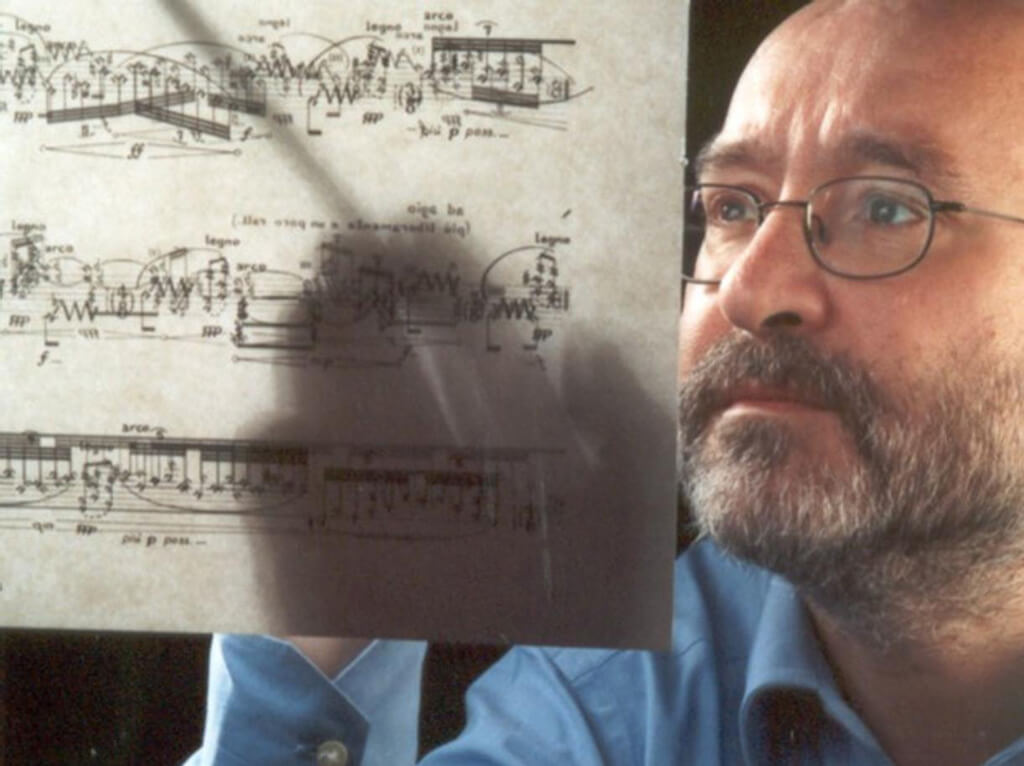
Salvatore Sciarrino, the highly respected and widely performed Italian composer, is coming to Toronto and is bringing with him a whole week of new music.
There are dozens — if not hundreds — of successful composers from Europe who have made extended techniques and sound production their calling card, but Sciarrino manages to stand beyond the rest, while never really departing from the traditions and practice of post-1945 European new music. His works for flute have potentially revolutionized modern flute composition, due to their sophisticated blend of sound manipulation and tone, creating an extensive rhetorical language freed from the gimmickry and cheap effect of most contemporary extended techniques.
The sound-language of Sciarrino’s music is instantly identifiable as a composer raised on modernism, but the adage “je ne sais quoi” comes to mind while listening: there is something else here.
[Codex Purpureus I (1983) for string trio. Ensemble Recherche.]
Largely self-taught, the 69-year-old composer’s music is held together by an incantatory and powerful self-will, as well as a distinctly Italian sense of caprice.
Take, for example, Sciarrino’s 1983 work, Codex Purpureus I, for string trio. The music, consisting of small, flickering gestures, mediates between presence and weight, tone colour and noise, like orphaned Baroque ornamentations. The sounds emanating from the bow and strings never push themselves, rather, they seem to tremble and flicker like a cowering penitent in front of a divine presence. As Codex Purpureus I progresses, these gestures coagulate, sparkle and frequently burn out in a constant mediation between sound and silence. The results are always enigmatic and sometimes overwhelming for listeners: what could this all possibly mean?
Despite the radical and enticing sounds in his music, glancing at Sciarrino’s operas reveal a preoccupation with the past: reinterpretations of Shakespeare’s Macbeth, Wagner’s Lohengrin, and his 1996-98 work Luci mie Traditrici “The Killing Flower”, loosely based on the life of radical Renaissance-era composer Carlo Gesualdo, which will receive its Canadian premiere during Sciarrino’s residence as the 2017 Roger D. Moore Distinguished Guest in Composition at the University of Toronto New Music Festival. The festival will feature several performances of Sciarrino’s music by local musicians (including a concert by Toronto’s oldest-running new music producer, New Music Concerts), student groups, as well as visiting musicians from Italy.
In conclusion, how does one listen to the music of Sciarrino? There is no straight answer, but perhaps the solution lies in opening yourself up to the ephemerality of materiality, and the exquisiteness and strangeness of sound and music itself.
Opera in Concert: “The Killing Flower” by Salvatore Sciarrino
Produced by Wallace Halladay and New Music Projects.
February 1, 7:30 p.m., Walter Hall, University of Toronto Faculty of Music (80 Queens Park, Toronto)
$30 regular, $20 seniors, $10 student
Pre-concert talk at 6:30 p.m. with Dr. Catherine Moore and U of T’s Theatre of Voices directed by David Fallis
New Music Concerts: “Four Views of Salvatore Sciarrino”
February 5, 8 p.m. Walter Hall, University of Toronto Faculty of Music (80 Queens Park, Toronto)
$35 regular, $25 seniors/arts workers, $10 student
7:15 p.m. pre-concert talk.
More Salvatore Sciarrino and new music events at the 2017 University of Toronto New Music Festival, running January 28 to February 5.
Calendar with full event schedule here.
#LUDWIGVAN
- PREVIEW | U of T Faculty of Music Brings Salvatore Sciarrino to Toronto - January 27, 2017
- PREVIEW | The Music Gallery Gears Up For The Viking Of 6th Avenue - November 25, 2016
- SCRUTINY | Esprit Orchestra Salutes The Legacy Of R. Murray Schafer - October 28, 2016



